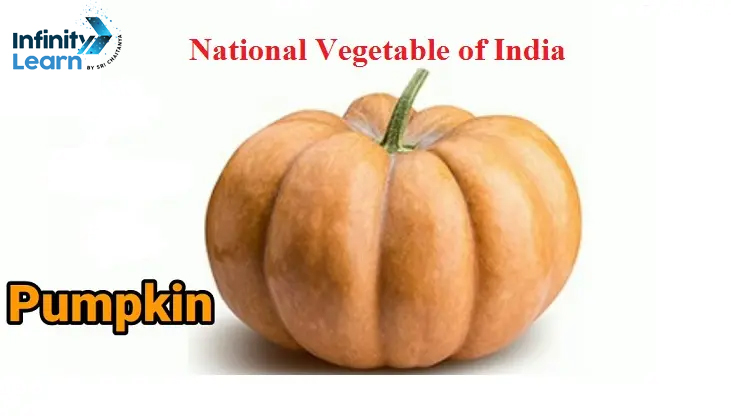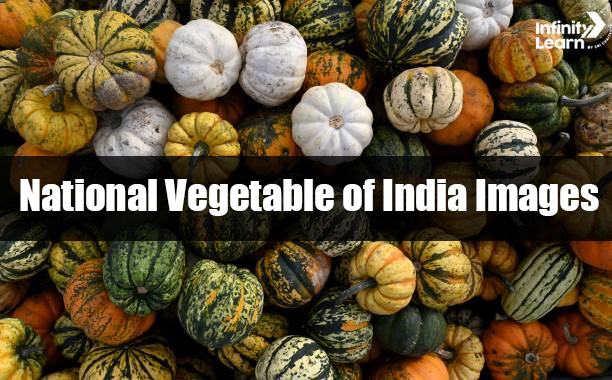Table of Contents
The national vegetable of India is the Indian pumpkin, commonly known as ‘Kaddu’ in Hindi. This versatile vegetable grows abundantly across the country and is a staple in Indian cuisine.

National Vegetable Of India Name
The national vegetable of India is the Indian pumpkin, popularly known as ‘Kaddu’ in Hindi. This versatile vegetable grows throughout India and does not require special soil conditions, making it easy to cultivate as a climber or creeper. Known as the poor man’s vegetable due to its rapid growth and abundant yield, Kaddu pairs well with dals, spices, and other vegetables because of its sweet flavor. It is grown and consumed widely across tropical India, thriving particularly during the hottest months of the year.
Also Check: General Topics
What is the National Vegetable of India
Pumpkins are spherical winter squashes having smooth to slightly ribbed skin that may vary in color from deep yellow to orange. Their outer cover is a fleshy and tough shell enclosing the seeds and the pulp. The word pumpkin encompasses fruit varieties that closely resemble Cucurbita pepo varieties but belong to Cucurbita maxima, Cucurbita argyrosperma, and Cucurbita moschata species.
The history of pumpkin dates back to 7000 to 5000 BC since it one of the earliest domesticate plants. They are used for commercial, food, ornamental, and recreational purposes. Pumpkin is an important ingredient in the traditional Thanksgiving meal in Canada and the United States and the pumpkin faced lantern that is lit on the Halloween festival. But commercially canned pumpkin purée and pumpkin pie fillings are generally prepared using certain varieties other of winter squash instead of pumpkins that are grown for jack-o’-lanterns.
Pumpkins in general are cultivated for both food as well as ornamental reasons in most parts of the world. They are raised in all continents excluding Antarctica. The Connecticut field pumpkin also known as jack-o’-lantern American pumpkin is the typical American pumpkin for carving into jack-o’-lanterns.
Also Read: List of 50 Fruits Name in Hindi and English
National Vegetable Of India Is Pumpkin- Etymology
The Oxford English Dictionary relates the word ‘pumpkin’ to the Greek word ‘pepon’, which in turn means ‘melon’. This term evolved through several languages: The word ‘pumpkin’ is more recent than the word ‘peponem’ as it dates back to the 17th century when the English colonists in the northeastern part of the United States Anglicized the Early Modern English word as “pompion” to “pumpkin. ” According to the OED (2017) the change is made from the Middle French ‘pompon’ to the Early Modern English pompion.
Another possible origin could be from the Massachusetts term pôhpukun this is translated as ‘grows forth round. Indeed, only the word “squash” means what it means now, while in related Massachusetts terms it was used as “askutasquash” form of linguistically related Narragansett language.
Pumpkin is usually referred to as a type of squash or the common name for squash or winter squash but neither has a specific botanical or scientific definition. In North America and the UK the meaning of the word ‘pumpkin’ usually refers to the shorter fibrous types of winter squash that are derived from mainly C. pepo. However, in New Zealand and Australia, the word “pumpkin” is used for all of the winter varieties.
National Vegetable of India Images

National Vegetable of India in Hindi
भारत की राष्ट्रीय सब्जी: कद्दू
भारत की राष्ट्रीय सब्जी कद्दू है, जिसे हिंदी में ‘कद्दू’ कहा जाता है। चिकनी, थोड़ी पसली वाली त्वचा के साथ गोल आकार का शीतकालीन स्क्वैश, कद्दू का रंग गहरे पीले से लेकर नारंगी तक भिन्न होता है। बीज और गूदा इसके मोटे खोल के भीतर समाहित होते हैं। “कद्दू” नाम आमतौर पर कुकुर्बिता पेपो की किस्मों पर लागू होता है, लेकिन यह कुकुर्बिता मैक्सिमा, कुकुर्बिता आर्गीरोस्पर्मा, और कुकुर्बिता मोस्चाटा की किस्मों पर भी लागू होता है जिनकी उपस्थिति समान होती है।
कद्दू सबसे पहले पालतू बनाए गए पौधों में से एक है, जिसका उपयोग 7,500 से 5,000 ईसा पूर्व के बीच के प्रमाण के साथ होता है। कद्दू का उत्पादन आमतौर पर व्यावसायिक उद्देश्यों के साथ-साथ भोजन, सजावट और आनंद के लिए किया जाता है। कद्दू पाई कनाडा और संयुक्त राज्य अमेरिका में थैंक्सगिविंग डिनर का एक पारंपरिक हिस्सा है, और कद्दू को अक्सर हैलोवीन सजावट के लिए जैक-ओ-लैंटर्न में उकेरा जाता है। हालांकि, व्यावसायिक रूप से डिब्बाबंद कद्दू प्यूरी और कद्दू पाई भरने को आमतौर पर जैक-ओ-लैंटर्न के लिए इस्तेमाल किए जाने वाले शीतकालीन स्क्वैश से बनाया जाता है।
कद्दू का उत्पादन दुनिया भर में कई कारणों से किया जाता है, जिनमें कृषि, वाणिज्यिक और सजावटी शामिल हैं। दुनिया के सभी सात महाद्वीपों में से केवल अंटार्कटिका ही कद्दू नहीं उगा सकता है। कनेक्टिकट फील्ड कद्दू जैक-ओ-लैंटर्न के लिए क्लासिक अमेरिकी कद्दू है।
कद्दू की व्युत्पत्ति
ऑक्सफोर्ड इंग्लिश डिक्शनरी के अनुसार, अंग्रेजी शब्द “पम्पकिन” प्राचीन ग्रीक शब्द पेपोन से लिया गया है, जिसका अर्थ है ‘तरबूज’। यह शब्द लैटिन शब्द पेपोनम और मध्य फ्रांसीसी शब्द पोम्पोन से प्रारंभिक आधुनिक अंग्रेजी पोम्पियन तक विकसित हुआ, जिसे 17वीं शताब्दी के अंग्रेजी उपनिवेशवादियों द्वारा उनके आगमन के तुरंत बाद “पम्पकिन” में बदल दिया गया।
मैसाचुसेट्स शब्द “पोहपुकुन”, जिसका अर्थ है ‘आगे बढ़ना’, कद्दू के लिए एक और व्युत्पत्ति है। स्क्वैश एक मैसाचुसेट्स शब्द से लिया गया है जिसे बारीकी से संबंधित नारगांसेट भाषा में “आस्कटास्कुश” के रूप में विभिन्न रूपों में प्रस्तुत किया गया है।
“कद्दू” शब्द का प्रयोग “स्क्वैश” और “विंटर स्क्वैश” के साथ परस्पर किया जाता है और इसका कोई वानस्पतिक या वैज्ञानिक अर्थ नहीं है। कद्दू आमतौर पर केवल विशेष गोल नारंगी प्रकार के शीतकालीन स्क्वैश को संदर्भित करता है, जो मुख्य रूप से उत्तरी अमेरिका और यूनाइटेड किंगडम में कुकुर्बिता पेपो से प्राप्त होता है। हालांकि, न्यूजीलैंड और ऑस्ट्रेलिया में, “कद्दू” शब्द सभी शीतकालीन स्क्वैश पर लागू होता है।
FAQs on National Vegetable of India
Why is Pumpkin the national vegetable?
The pumpkin is the national vegetable of India because it grows widely across the country, requires minimal special care, and is a staple in various regional cuisines.
Which is the national veg food of India?
There isn't an officially designated national vegetable food of India, but popular vegetarian dishes include dal (lentils), sabzi (vegetable curry), and roti (flatbread).
What is our state vegetable?
Different states in India have their own designated state vegetables. For example, the state vegetable of Punjab is the turnip, while Kerala's state vegetable is the elephant foot yam.
Which is the king of vegetables?
The brinjal (eggplant) is often referred to as the king of vegetables due to its versatility and importance in various cuisines across India.
Is brinjal the national vegetable of India?
No, brinjal is not the national vegetable of India. The national vegetable of India is the pumpkin.
Which is our national vegetable of India?
The national vegetable of India is the pumpkin, commonly known as kaddu in Hindi.





